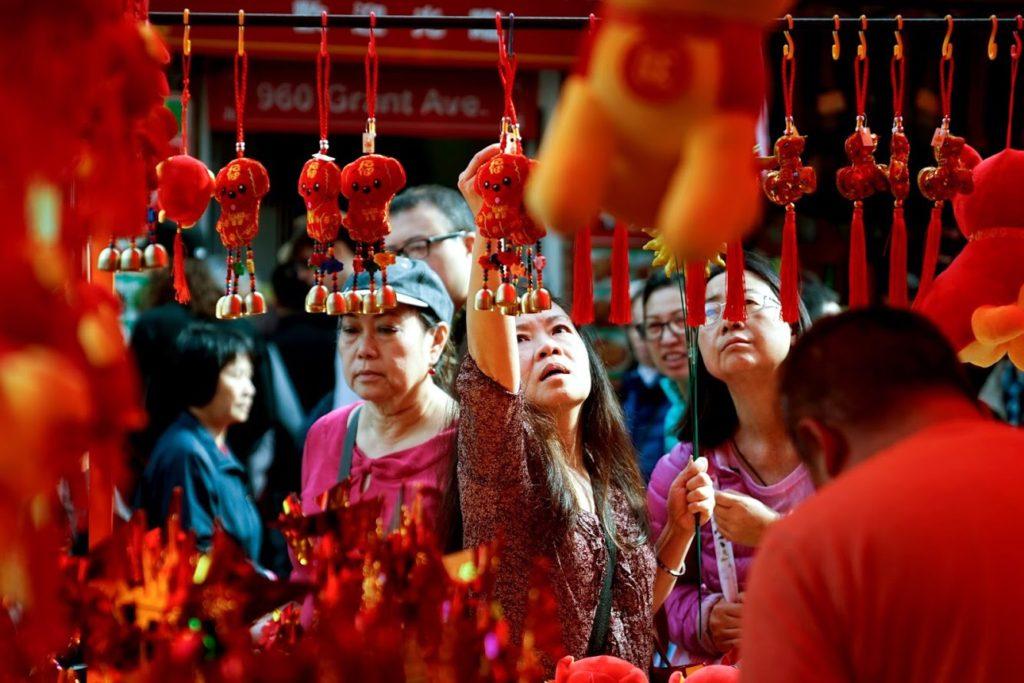Over a quarter of the world’s population is celebrating Lunar New Year today, or what is also called the Spring Festival in many other countries including: Indonesia, Vietnam and the Philippines.
Thirty-five percent of San Francisco’s total population is made up of people from Asian backgrounds — almost half of that demographic is Chinese, according to the most recent census data.

It’s no surprise that San Francisco’s annual Chinese New Year parade (scheduled for Feb. 24) has become a staple in the City’s calendar and one of the largest parades celebrating the Lunar New Year outside of China.
“It’s a way to gather everyone,” said Annie Thai, a post-baccalaureate SF State student. “When it hits midnight, my family and I would drive to the temple. And it gets super crowded, especially in San Jose where I live. We would stay there in the Buddhist temple all night.”
Thai is by herself in the library with fake bones and notes laid before her on the table.

“But I can’t go tonight because I have this anatomy test tomorrow at 8 a.m.,” Thai said, busily flipping through her notes as she spends New Year’s Eve on the third floor of the J. Paul Leonard Library.
Thai is not the only SF State student that has limited time to spend with her family on New Year’s Day, which is a time usually reserved for family dinners and reunions.
Each year, over 300 million mainland Chinese migrate long distances to meet family for the holidays, according to an article by Forbes .
Lisha Xie, a third-year SF State student originally from China and studying business management, expressed concerns about the lack of recognition of Lunar New Year traditions, especially regarding family dinners and reunions, citing a lack of time as the problem.

“In China we have the holiday off … but here we have to go to school and work. It’s hard for us to get together as a family,” Xie said frustratingly. “San Francisco has a lot of Chinese people and if the city can give us a holiday to celebrate the new year that would be great.”
“At the least we can have a break or go home early to have dinner with family,” Xie said, explaining that this year in particular is special because her father was born on the Year of the Dog.
In China, most people get three days off to celebrate the new year, sometimes extending longer if the holiday falls on a weekend. Other Asian countries give people days off as well, with Vietnam sometimes holding a week off for the holidays and Taiwan giving people at least four days. According to data from Chinese travel guides.
Ada Ma, a first-year SF State student studying nursing, expressed similar concerns over the little time she has with her family over the holidays. Explaining that with a family of seven, it’s becoming harder each year to maintain Lunar New Year traditions.
“It would be good if we recognize [Chinese New Year] as a holiday so we can have time with our family … just like Christmas.” Karen Zhang, a third-year accounting student, said as she rushed through Malcolm X Plaza heading to work on New Year’s Eve.

Plans to revitalize the energy of Lunar New Year in the student body are underway at SF State. The Chinese Flagship Program, in collaboration with the Confucius Institute plan to host their annual Chinese New Year celebration on March 2 at Jack Adams Hall.
The reception will include both traditional and contemporary performances by students, faculty and alumni.
“It’s a cultural celebration,” said Mia Segura, a program coordinator for the Chinese Flagship Program. “A way in which we can bring more culture into campus. Initially we had students come in and perform traditional chinese dances, but if they are more interested in other things they can do that too.”
Students spoke highly of the traditions carried throughout the Chinese New Year, whether it was setting up lanterns, making food or gifting each other hóngbāo, the red envelopes with even numbered dollar bills.
“This year since it falls on a weekend my whole family will get together and eat dinner at home,” Thai said. “I love Chinese New Year because it’s a way for me to get back to my culture. It’s a huge deal and I try to hold on to it as much as my parents do … I hope it doesn’t slip away.





